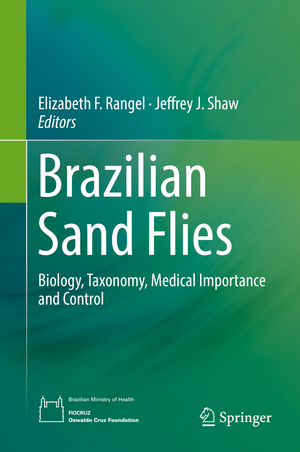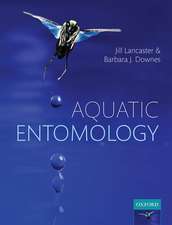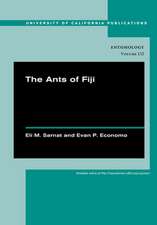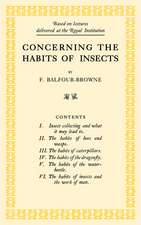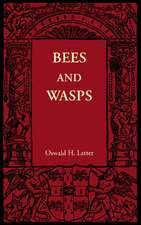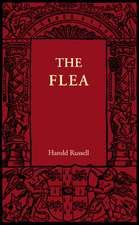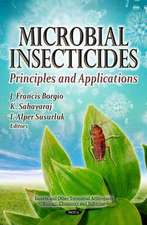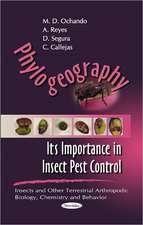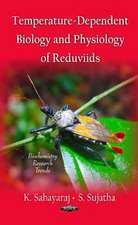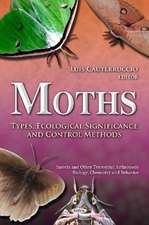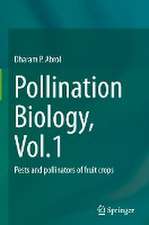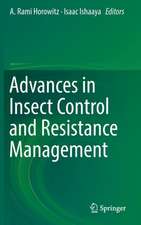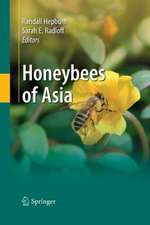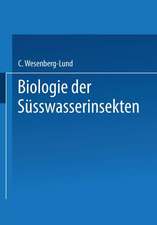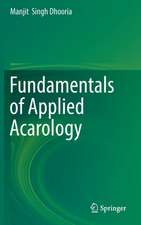Brazilian Sand Flies : Biology, Taxonomy, Medical Importance and Control
Editat de Elizabeth F. Rangel, Jeffrey J. Shawen Limba Engleză Hardback – 9 iul 2018
| Toate formatele și edițiile | Preț | Express |
|---|---|---|
| Paperback (1) | 954.77 lei 6-8 săpt. | |
| Springer International Publishing – 25 ian 2019 | 954.77 lei 6-8 săpt. | |
| Hardback (1) | 961.10 lei 6-8 săpt. | |
| Springer International Publishing – 9 iul 2018 | 961.10 lei 6-8 săpt. |
Preț: 961.10 lei
Preț vechi: 1172.06 lei
-18% Nou
Puncte Express: 1442
Preț estimativ în valută:
183.93€ • 191.32$ • 151.84£
183.93€ • 191.32$ • 151.84£
Carte tipărită la comandă
Livrare economică 14-28 aprilie
Preluare comenzi: 021 569.72.76
Specificații
ISBN-13: 9783319755434
ISBN-10: 3319755439
Pagini: 377
Ilustrații: XVIII, 494 p. 95 illus., 33 illus. in color.
Dimensiuni: 155 x 235 x 35 mm
Greutate: 0.89 kg
Ediția:1st ed. 2018
Editura: Springer International Publishing
Colecția Springer
Locul publicării:Cham, Switzerland
ISBN-10: 3319755439
Pagini: 377
Ilustrații: XVIII, 494 p. 95 illus., 33 illus. in color.
Dimensiuni: 155 x 235 x 35 mm
Greutate: 0.89 kg
Ediția:1st ed. 2018
Editura: Springer International Publishing
Colecția Springer
Locul publicării:Cham, Switzerland
Cuprins
Chapter 1: Phlebotominae Sand Flies, Medical Importance.- Chapter 2: Classification, Morphology and Terminology of adults and Identification of the American taxa.- Chapter 3: Molecular and biochemical markers for investigating the vectorial roles of Brazilian sand flies.- Chapter 4: Regional Distribution and Habitats of Brazilian Phlebotomine Species.- Chapter 5: Bionomy. Biology of Neotropical Phlebotomine Sand flies.- Chapter 6: The biology of the Leishmania-sand fly interaction. Chapter 7: Sand fly vectors of American Cutaneous Leishmaniasis in Brazil.- Chapter 8: The eco-epidemiology of American visceral leishmaniasis, with particular reference to Brazil.- Chapter 9: Brazilian Phlebotomines as hosts and vectors of viruses, bacteria, fungi, protozoa (excluding those belonging to the genus Leishmania) and nematodes.- Chapter 10: Methods for Capturing, Processing and Preserving Phlebotomine.- Chapter 11: Leishmaniasis Vector Surveillance and Control in Brazil: A challenge to Control Programs.
Notă biografică
Dr. Elizabeth Ferreira Rangel is a public health investigator who presently leads PAHO/WHO´s National and International reference centre on the control, surveillance, taxonomy and ecology of leishmaniasis´ vectors that is located at the Oswaldo Cruz Foundation´s Oswaldo Cruz Institute in Rio de Janeiro, Brazil. She is an advisor to Brazil´s Ministry of Health and the organizer of the foundation´s Leishmaniasis reference network. Dr Rangel is a member of the Pan American Health Organization´s Leishmaniasis Control Program Expert Committee and a WHO Expert Advisor on Parasitic Diseases (Leishmaniasis).
Professor Jeffrey Jon Shaw has worked on leishmaniasis in Brazil since 1965, initially in the Amazon region, where he was based at the Instituto Evandro Chagas, Belém, Brazil. In 1994 he left Belém to take up a tenured professorship in São Paulo University´s Parasitology Department located in its Biomedical Sciences Institute. He retired in 2008 but continues there as a Senior Professor. He has been a member of three WHO Leishmaniasis Expert Committees, is a WHO expert advisor on Parasitic Diseases (Leishmaniasis) and an advisor to national and international research and funding agencies. Prof. Shaw is a fellow of the Brazilian Academy of Science, the American Society of Tropical Medicine and Hygiene and founder and director of the International Leishmaniasis discussion group (Leish-L).
Professor Jeffrey Jon Shaw has worked on leishmaniasis in Brazil since 1965, initially in the Amazon region, where he was based at the Instituto Evandro Chagas, Belém, Brazil. In 1994 he left Belém to take up a tenured professorship in São Paulo University´s Parasitology Department located in its Biomedical Sciences Institute. He retired in 2008 but continues there as a Senior Professor. He has been a member of three WHO Leishmaniasis Expert Committees, is a WHO expert advisor on Parasitic Diseases (Leishmaniasis) and an advisor to national and international research and funding agencies. Prof. Shaw is a fellow of the Brazilian Academy of Science, the American Society of Tropical Medicine and Hygiene and founder and director of the International Leishmaniasis discussion group (Leish-L).
Textul de pe ultima copertă
This is the first English-language book dedicated to Brazilian sand flies and their medical importance. No other country has so many species of these haematophagous insects as Brazil and their diversity has reached an astonishing level. The book contains comprehensive chapters, written by Brazilian experts on their regional distribution, their ecology and their importance as vectors of pathogens and parasites. Methods for sampling, processing and preserving phlebotomines are reviewed as are perspectives on surveillance and leishmaniasis vector control. A novel classification is presented whose aim is to help investigators identify the species that they are working with more efficiently.
Caracteristici
The first English-language book focused on Brazilian sand flies and their medical importance
Proposes a novel taxonomy classification to improve species identification
Discusses biological and ecological aspects as well sampling methods and leishmaniasis vector control
Proposes a novel taxonomy classification to improve species identification
Discusses biological and ecological aspects as well sampling methods and leishmaniasis vector control
